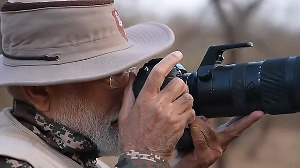Key members of the empowered group of ministers (EGoM) are arriving at a consensus on rejecting a Telecom Regulatory Authority of India (Trai) recommendation to link 2G spectrum price beyond 6.2 MHz with the recently concluded 3G spectrum auction price.
If cleared by the EGoM, headed by Finance Minister Pranab Mukherjee, the move would provide relief of over Rs 20,000 crore to telecom operators like Bharti Airtel, Vodafone-Essar, Idea Cellular, BSNL, Aircel, Reliance and MTNL, which have been given spectrum beyond 6.2 MHz in various circles.
These operators received additional spectrum up to 10 Mhz based on the current criterion of subscriber numbers. Based on Trai's recommendation, they would have had to fork out large amounts of money.
In May, the Trai recommendations were strongly criticised by telecom operators, who lobbied the government to reject or change them. The Prime Minister's Office referred the proposals to the EGoM.
The EGoM had been constituted earlier to resolve a dispute between the department of telecommunications (DoT) and ministry of defence on the latter vacating 3G spectrum for auction. Communications Minister A Raja is part of the EGoM.
"We are not in favour of linking 2G spectrum price with that of 3G spectrum, as this will lead to many legal complications," said an EGoM source.
Existing players say linking the prices of these differing technologies is unfair, as 3G is three times more efficient than 2G spectrum. Moreover, they argue, 3G auction prices were artificially high because of the shortage of spectrum with the government and do not reflect ground reality.
DoT, which has also looked into the recommendations independently through its own committee, has also felt that linking 2G and 3G prices might not be fair, considering that 3G is much more efficient. Internal discussions earlier were veering around the view that 2G should be priced at one-third of 3G.
Trai has called a group of experts to advise it on a 2G spectrum pricing formula and its recommendations are still awaited. It had earlier asked the government to wait for the panel's proposals before taking a decision.
Trai also recommended major changes to spectrum policy, which include re-farming 900 MHz of spectrum, which is held by operators like Bharti Airtel and Vodafone Essar, among others, for 2G services. It also suggested that telcos pay for spectrum at market rates when their licences come up for renewal for 10 years from 2014. This is another key issue that has to be deliberated upon by the EGoM.
Operators complain they would have to pay a staggering Rs 1 lakh crore between 2014 and 2021 for spectrum once their licences came up for renewal, and that this would cripple them financially. However, the regulator feels operators would also save at least Rs 48,000 crore over the next 20 years because Trai had simultaneously suggested a lower 6 per cent revenue share across the country with the government from an average 8.22 per cent.












 © 2025
© 2025